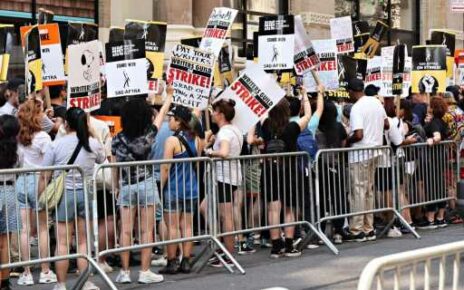ASIO boss Mike Burgess has warned Australians to be vigilant as he revealed the nation is experiencing the highest level of foreign interference and espionage in its history, surpassing the Cold War, September 11 and the height of the Islamic State caliphate.
In his latest annual threat assessment – the first since the federal election in May 2022 – Burgess also revealed his agency had disrupted and deported a “hive of spies” in the past 12 months who had recruited proxies and agents as part of a broader goal to steal sensitive information.
ASIO director-general Mike Burgess says the level of foreign interference and espionage targeted at Australians is at its highest-ever level.Credit:Alex Ellinghausen
He said the hive was bigger and more dangerous than a nest of spies dismantled several years ago and reported by ASIO, saying he had decided to highlight the case to “dispel any sense that espionage is some romantic Cold War notion”.
“Based on what ASIO is seeing, more Australians are being targeted for espionage and foreign interference than at any time in Australia’s history – more hostile foreign intelligence services, more spies, more targeting, more harm, more ASIO investigations, more ASIO disruptions,” Burgess, the agency’s director-general, said in a speech on Tuesday night.
“From where I sit, it feels like hand-to-hand combat.”
Burgess also detailed a sensational plot by an overseas intelligence service to covertly recruit senior Australian journalists using the offer of an all-expenses-paid study tour of the foreign country, where spies posing as local officials were expected to steal information and contacts.
The plan was foiled by ASIO before it could be put into action. But it was advanced enough that the foreign power had recruited an Australian-born “lackey” who was well-connected in political and business circles and not publicly connected with the overseas government to make the overture to the journalists.
“Once in-country, the lackey was expected to introduce the journalists to ‘local officials’ who were really spies in disguise. The spies would use these opportunities to ingratiate themselves with the reporters, try to elicit insights on political, economic, defence and other issues, and identify any vulnerabilities that could be leveraged later,” Burgess said in the speech.
He said the journalists’ phones, laptops and tablets would likely have been hacked, with malware installed to give the spies ongoing access, potentially exposing sources, stories, calls and emails.
The plot was part of a “discernable and concerning uptick” in the targeting of journalists and the media industry, with the influence and recruitment taking many forms.
“Foreign intelligence services have used cut-outs and front companies to offer funding for programs, almost certainly with the intent to shape the coverage in favour of the foreign government,” Burgess said.
He also revealed a small number of judicial figures had been subject to suspicious approaches, suspected but not confirmed to be connected to foreign intelligence operations. In addition to this, Burgess said ASIO had recently foiled attempts by two foreign powers to physically harm Australian residents who were critics of those regimes
“In one case, the intelligence service started monitoring a human rights activist and plotted to lure the target offshore, where the individual could be – quote – ‘disposed of’. In another, a lackey was dispatched to locate specific dissidents and – quote – ‘deal with them’,” he said.
Burgess said multiple nations were behind the foreign interference activities in Australia, and ASIO had adopted a more aggressive approach to counter-espionage that involved recruiting new people and adopting new tactics.
In keeping with ASIO policy, he did not name the countries or individuals involved, but he noted that while some were authoritarian regimes, others were governments considered friends by Australia. A key driving factor, he said, was Australia’s strategic significance in the Indo-Pacific region, where a power contest between the United States and China is under way.
“They are using espionage to covertly understand Australia’s politics and decision-making, our alliances and partnerships, and our economic and policy priorities. They are using espionage to recruit to their own cause elected officials, public servants, well-placed individuals in business, and leaders in our communities,” he said.
Earlier on Tuesday, former prime minister Malcolm Turnbull told a high-powered parliamentary committee that the “most active state and political party seeking to influence public affairs in Australia is that of China and the Communist Party of China, we know that”.
“The intelligence agencies, security agencies have a very good idea of who’s doing what. I wouldn’t even describe it as covert – it’s pretty blatant operations,” he said.
Turnbull told the parliamentary joint committee on intelligence and security that the foreign influence transparency scheme he established in 2018 needed to be overhauled to ensure activities of concern did not go undetected.
He said it defied credulity that, according to the register, no organisation in Australia had any association with the Chinese Communist Party’s United Front Work Department, which is tasked with using the diaspora of citizens abroad to gather intelligence and promote Beijing’s message.
Katherine Mansted, a senior fellow at the Australian National University’s national security college, said: “There are blind spots particularly when it comes to capturing influence that emanates from authoritarian governments, which tends to be more complex, opaque and secret by nature.”
Cut through the noise of federal politics with news, views and expert analysis from Jacqueline Maley. Subscribers can sign up to our weekly Inside Politics newsletter here.
Most Viewed in Politics
From our partners
Source: Read Full Article


